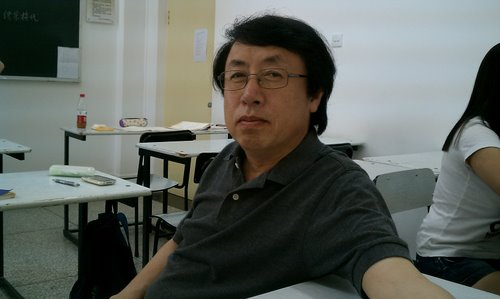Why Would Anyone Want to Study Chinese?
 Tuesday, August 31, 2010 at 11:52PM
Tuesday, August 31, 2010 at 11:52PM Some of you have asked me why people come to BLCU for a one-month (or longer) intensive Chinese language study. I’ve been meaning to write about the topic for a while—sorry for the delay. Here are some of my classmates’ stories (unfortunately, I didn’t have pictures of everyone).
The first student I want to introduce to you is Lee Dong-Deuk. Lee is a 53 year-old businessman from Seoul, South Korea. Twenty years ago, he started a business importing wall coverings into South Korea (the company’s website is here). Lee is taking a month off from the day to day operations of the company to come here and study. Lee has studied Chinese in Korea for the last two years with an online Chinese teacher. He is studying because he likes languages and also because he sees potential business opportunities in China. He knows that being able to speak Mandarin will help him build relationships and conduct negotiations with Chinese buyers and suppliers.
 Lee
Lee
Sanchul Park is another Korean in my class. He recently received his law degree from the University of Chicago and next week will be going to London to start a 6-month job with a law firm there. He is in China because he “started studying Chinese and didn’t want to stop” before he became proficient at the language. But why did he start? Apparently, some years ago, he had a Taiwanese girlfriend who got him interested in speaking Chinese. Sounds like a good reason to me. Sadly, the two have since broken up. You could say that Sanchul gave up on the girl but not on her language.
 Sanchul
Sanchul
Han Byul, also from Korea, is currently living in Switzerland and working on a master’s degree in contemporary Chinese art. She speaks fluent English and German and is studying Chinese so that she can read and understand Chinese texts dealing with art without having to rely on translators.
My four Spanish friends all have different reasons (see their pictures here). Silvia is a student who just finished her first year studying business at university in Barcelona. She speaks Spanish, English, Catalan and Chinese. Someday she would like to start her own business with a partner, and she thinks that Chinese may be useful for her work. If she doesn’t start her own business right away, she knows that her Chinese language skills will help differentiate her for the other job candidates when the time comes to look for a job.
Daniel, also from Madrid, is about to start his third year as a philosophy major. He and Susana studied at the same university, even sharing the same Chinese teacher at one point, but they never met until they came to Beijing. Daniel also speaks Spanish and English. I’m not sure of the exact reason he studies Chinese, but I know that he likes to travel and meet new people. As a philosophy student, knowing Chinese would give him access to China’s rich philosophical traditions.
Luis is a judge from Madrid who works for Spain’s constitutional court system, and I agree with someone who said that he is “the most fun judge I have ever met!” Luis is a student of law, philosophy, literature and languages. He spent part of his high school years in Michigan and later spent time studying law in an exchange program at Harvard, so his English is very good. Charming, entertaining, interesting and outgoing are all words that capture part of his essence. Luis has a natural gift when it comes to meeting people and making friends, and by adding Chinese to the languages he speaks he will open up doors to an untold number of new friends.
Susana, from Madrid, is a chemical engineer who has been working as a process engineer since she graduated two years ago. She speaks English and Spanish, a little Chinese, and has recently begun to study Italian too. Susana thinks it would be fun to work abroad for a couple of years, and is interested in working in China.
Caterina is a student from Florence (Firenze), Italy. She just finished her first three years at university and will be moving to Venice this fall to complete her specialization in Chinese language and Chinese literature. Someday she would like to teach Chinese in Firenze. Caterina is a very diligent student, and several times she helped me understand what the teacher was saying when she assigned the homework. Caterina has taught English to Italian children and Italian to foreigners, so I am hoping that someday if I take my family to Florence she would be willing teach my kids (and me, for that matter) Italian.
Roberta, who sits next to me in class, is another student from Italy. She is going to stay in Beijing until February so that she can really work on her speaking capabilities. Roberta has a master’s degree in language and culture. She studied in Australia for a while, so her English is very good (though sometimes strange) and she dreams of returning to Australia someday to write about Aboriginal culture. Hopefully, her language skills will open up a door to do that.
 Last class!
Last class!
These are some of the students that I have met at BLCU (note: if you read about yourself above and I made any mistakes, please correct me). They all have different stories and different goals than I do, but we all share a desire to study languages. For most of the people I have met, Chinese is at least the third language that each one can speak. For some it’s the fourth or fifth. Since learning a language can be such a difficult undertaking, there must be something inside us that helps us persist.
The best explanation I can come up with is that all of us are adventurers at heart. We love to see new places, experience new things and above all, we want to meet new people and learn about their lives. Getting to know someone is one of life’s biggest gifts. It’s not easy to describe, but once you have learned a new language well, doors seem to magically open up. You find that you can better understand how people see the world, you can experience new places more fully and you can feel more confident in your ability to overcome challenges. That is why we study languages, including Chinese, and the best way to study is to come to China. All of these reasons are why people come to BLCU to study Chinese.



Reader Comments (4)
Will, I love the word " Adventurer at heart ". Thank you for sharing your journeys. I enjoy reading a lot:)
When I speak Spanish, my second language, I feel I have a different personality because of how the language is spoken. I am more assertive and less polite. In fact, I feel like the language itself taught me some lessons about myself and in assertiveness. I wonder if people study languages as a form of self-knowledge, or of self-escape. If I don't like my personality when I am speaking one language, will I like it when I speak another? How does Chinese shape your personality?
Thanks Bee. I'm glad you're enjoying my journeys with me. It's been a lot of fun sharing them.
@Shayna: Do you think the language was your teacher, or the fact that you had to be more assertive to get what you wanted when living in Spain? I don't know what type of personality my "Chinese side" has, but I know that living in China made me a little more aggressive. I will talk about that in a post on the trip home, coming soon.
I don't know, I suppose a combination because when I speak Spanish I feel like a differentpart of me is speaking than when I speak English. This article in the NYT suggests that language itself shapes how people think by making their speaker emphasise certain details. Couldn't that in turn shape personality? one more point, why do I need to be more assertive in Spain? maybe because I am speaking with people who also speak Spanish and that culture was shaped by the language as much as the culture shaped the language. http://mobile.nytimes.com/2010/08/29/magazine/29language-t.xml